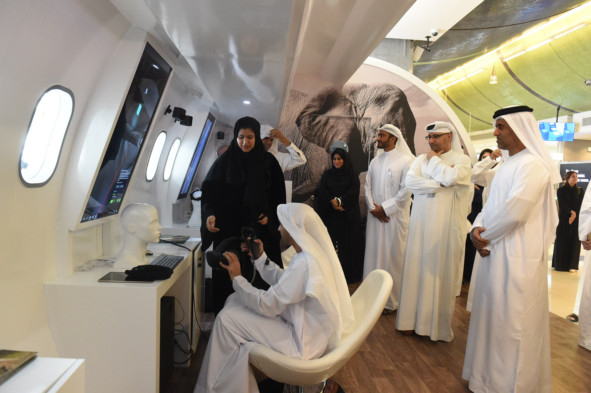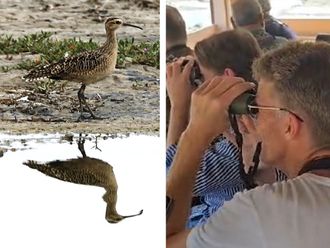
Abu Dhabi: Very soon, you can sit in a shopping mall in the UAE, put on a mixed reality headset and enter the world of wildlife to see for yourself how trafficking of endangered species is impacting their habitat and putting their future at stake.
A new awareness campaign called Beautiful in the Wild was launched by the Ministry of Climate Change and Environment in Abu Dhabi on Tuesday seeking to raise awareness on this seminal issue.
Using the HoloLens techonology, the headset will give individuals a virtual wildlife glimpse into the importance of protecting wildlife. HoloLens is a computer built into a headset that lets you see, hear and interact with holograms within a closed environment. With the help of a cutting-edge holographic computer, visitors can experience simulated interaction with wild animals in their natural environment.
Thani Ahmad Al Zeyoudi, Minister of Climate Change and Environment, attended the opening of the campaign at Abu Dhabi International airport, said, “Conservation of the ecosystem is one of the most important responsibilities we have as a nation and as human beings. Unfortunately, we still see certain harmful practices, such as illegal trade in endangered animals that cause an imbalance to the ecosystem and adversely impact our environment. The UAE government considers wildlife an important aspect of its heritage and sees the protection of endangered species as its top priority.”
Stressing the importance of creating empathy among the public for wildlife that are illegally traded on the black market, Aisha Al Aboudi, chief innovation officer and director of awareness at the ministry, said, “Nowadays people may get bored if we only give them leaflets to read or if we want to lecture them on the subject, so we need to find innovative ways of capturing their attention. That is why we have decided to go with the VR (virtual reality) experience,” said Al Aboudi.
“Our virtual reality programme is available in both English and Arabic,” said Al Aboudi. “It puts the person right into the environment of the animal and shows how they live, and the consequences of taking them out of the wild. The experience even shows the physical harm that happens to animals as a result of hunters who are trying to capture and traffic them. The VR provides the person with a close, in-depth look at the reality of what is happening,” she added.
“It’s always different when you are able to see something with your own eyes rather than simply being told about it,” Al Aboudi said.
The main message the campaign wants to send, she said, is that endangered animals are beautiful in the wild, a place where they truly belong “and they should not be taken out of the wild — they are not beautiful when they are put in private farms or a person’s home”, she added.
Al Aboudi said this awareness campaign was in line with the UAE’s overall goal of fighting the illegal trade of endangered species, and that the UAE would remain committed to the international agreements it has entered into on this issue.
“The UAE has undertaken massive efforts and works across multiple entities born out of our belief in preserving endangered animal species and to give them the chance to survive and live. This work has included the issuing of regulations and legislations towards combating the illegal wildlife trade.
“It is also important to remember that the UAE is a signatory to several international treaties against the trafficking of wildlife, and so we remain firm in meeting our obligations and international commitments,” she added.
The Beautiful in the Wild campaign is to be launched across the UAE over the coming weeks and months at venues such as Dubai International Airport and shopping malls.
Illegal trade
The illegal trade in wildlife is estimated at around $15-20 billion annually, and it is also one of the most prevalent commercial activities in the world besides trading in drugs, weapons, and human trafficking. Most of the world’s wildlife has become endangered due to illegal trade and the failure to regulate it and monitor the wildlife species. This scenario ultimately leads to their extinction.
The number of species included in the CITES (Convention on International Trade in Endangered Species of Wild Fauna and Flora) Convention is around 35,000 species of both animals and plants; they are divided in three appendices according to their protection level to protect them from the negative impact of international trade.
Nearly 100,000 African elephants have been killed between 2010 and 2012 for their ivory, poaching of rhinos has led to the disappearance of more than 90 per cent of its population during the last century. The numbers of falcons have continued to decline for many reasons, including capturing of live birds for falconry practices, human population expansion, pollution, nest disturbance and climate change.
As for the tiger, three subspecies are totally extinct out of the eight original subspecies of tigers: Bali tiger, the Caspian tiger and Javan tiger. Currently, no more than 3,200 tigers exist in the wild.
Sharks are also not spared from overfishing with more than 70 million sharks killed every year for their fins for preparing shark fin soup. Turtles are also caught illegally for meat, eggs and using their shells in crafting jewellery for tourists.
The UAE joined CITES in 1990 and issued the Federal Law No 11 of 2002 to implement Cites in order to develop strict measures to regulate the illegal wildlife trade by issuing permits for the entry and exit of these species, and to tighten control over transit goods.
Moreover, the ministry organises training workshops on a regular basis for UAE employers in collaboration with the International Fund for Animal Welfare, such as the workshop on the illegal trade in sharks and the training workshops for customs employees on the implementation of Cites which explains how to identify the endangered species listed on the Cites appendix.












